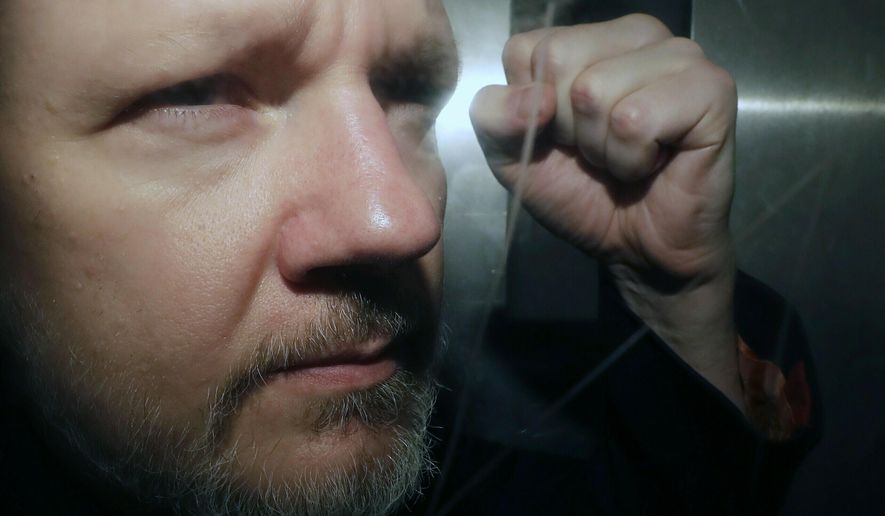British officials were pressed Thursday to release WikiLeaks publisher Julian Assange from a London prison where fellow inmates have recently contracted the novel coronavirus.
A pair of politicians from Mr. Assange’s native Australia raised grave concerns about keeping him jailed during the coronavirus pandemic and proposed placing him in home detention.
Rather than remaining at Belmarsh Prison, he should be freed and fitted with an ankle monitor, the co-chairs of the Australian Bring Julian Assange Home Parliamentary Group said.
Andrew Wilkie and George Christensen, the Australian parliamentarians who made the request, reasoned that Mr. Assange meets all of the criteria that should qualify for his release per the guidance of groups including the World Health Organization and U.K. Prison Officers Association.
“Mr. Assange is a non-violent remand prisoner with no history of harm to the community. He is not convicted and is thus entitled to the presumption of innocence,” they wrote in letters sent to Bob Neill, the chair of the U.K. Commons Justice Committee, and Robert Buckland, the British lord chancellor and secretary of state for justice.
They also said that Mr. Assange’s doctors have warned that he has a pre-existing chronic lung condition that makes him particularly susceptible to COVID-19, the infectious respiratory disease caused by the new coronavirus, adding that he is at “high risk from dying” if he becomes infected.
Multiple cases of COVID-10 have been confirmed within Belmarsh Prison and normal activities inside at the facility have accordingly been suspended, the Australians noted.
“Mr. Assange is in poor mental health due to spending much time in solitary confinement over recent years, and prison COVID-19 lockdown measures are further exacerbating his mental health,” the Aussies added.
Mr. Neill and Mr. Buckland did not immediately respond to requests for comment.
Mr. Assange, 48, has been charged in the U.S. with crimes related to soliciting, receiving and publishing classified military and diplomatic documents released online by WikiLeaks.
He has been jailed at Belmarsh for nearly a year while fighting a U.S. extradition request and the possibility of being convicted and sentenced to 175 years in prison.
More than 1.5 million people around the world have contracted COVID-19 since the disease was discovered in late December, according to data maintained by Johns Hopkins University.
Defense lawyers for Mr. Assange previously requested that he be released from Belmarsh because of the coronavirus outbreak, but their application for bail was ultimately denied.
“As matters stand today, this global pandemic does not of itself yet provide grounds for Mr. Assange’s release,” District Judge Vanessa Baraitser ruled from Westminster Magistrates Court last month.
Mr. Assange’s extradition trial began is currently scheduled to resume May 18.
• Andrew Blake can be reached at ablake@washingtontimes.com.




Please read our comment policy before commenting.